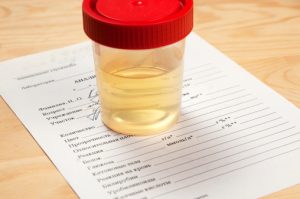
Urine is made up of water and dissolved chemicals, including sodium and potassium. It also consists of urea, made when protein breaks down, as well as creatinine, which forms from muscle breaking down. Our urine contains specific amounts of waste, but if these amounts are not within what is considered a normal range, or in cases where other substances are found, you may have a disease.
The 24-hour urine protein test involves collecting a urine sample in one or more containers over a period of 24 hours. The samples are always kept in a cool environment. This type of urine collection doesn’t show what types of protein are present—this requires a different type of testing.
Why take a 24-hour urine test?
A 24-hour urine protein test helps diagnose kidney problems. There are a number of conditions that can cause problems with kidney function, including those listed below:
- Diabetic nephropathy—due to uncontrolled diabetes
- High blood pressure—unusually high levels can lead to permanent kidney damage
- Lupus nephritis—the autoimmune disease can cause inflammation of the kidneys
- Urinary tract infection
- Prolonged urinary tract blockage
- Alport syndrome—an inherited issue that can cause scarring of the kidneys
- Nephrotic syndrome—a syndrome characterized by protein in the urine, low protein in blood, high cholesterol, and tissue swelling
- Polycystic kidney disease—a genetic disorder that leads to cysts in the kidneys
- Interstitial nephritis or pyelonephritis—inflammation in the small structures of the kidney often caused by infection
Risks linked with 24-hour urine collection
The 24-hour urine collection process is safe, so people who are asked to take the test don’t have much to worry about. There are certain factors that can impact the accuracy of 24-hour urine test results. For example, going beyond the 24-hour collection period, collecting too much urine, losing urine from the specimen container due to spillage, not keeping urine cold, excessive exercise, and stress can influence the results. Certain foods like coffee, tea, vanilla, cocoa, and citrus fruits can also affect urine test results, so it is a good idea to discuss any limitations with the doctor before providing samples.
Preparation tips for 24-hour urine test
A doctor’s instructions for urine sample collection may vary depending on what condition he or she suspects, but generally speaking, you will be given a container to urinate in. It’s important that you store the urine sample in a cool place. In some cases, people are told to collect their urine at a certain time and to avoid specific foods around the time of collection.
If you are pregnant or suspect that you might be, tell a doctor. It is also important to tell your healthcare provider about any medications you might be taking, as well vitamins, herbs, and supplements.
What happens during a 24-hour urine collection?
When it comes to 24-hour urine test directions, it depends on your healthcare provider, but generally, the doctor will give you containers to take home.
Here is the basic process:
- A specimen pan fits in the toilet or urinal to collect the urine
- Urine is transferred from the pan to a plastic container
- The container is placed in a cold refrigerator or a cooler with ice in it
- Collection may start anytime during the day or after you first urinate in the morning.
- Urine must be collected in the following 24-hour period
- You flush the first time you urinate on the start date. Urine after the first flush is collected and stored.
- Urinate again at the same time (24 hours after the start time)
- As soon as possible, take the containers to the doctor
24-hour urine protein test results
Normal urine values range from 80 to 100 milligrams of protein per 24-hours, with a fluid intake of about two liters per day. It’s important to note that normal ranges can vary from one laboratory to another. Many doctors consider a normal test to be less than 150 milligrams of protein per day.
While it is true that protein in the urine can be a sign of kidney disease, protein levels can temporarily rise due to factors we mentioned earlier. If the protein is a result of kidney damage, the tests may help determine the extent of the damage. Protein amounts can be used to monitor the extent of disease progression and to measure the response a person is having to a particular therapy.
If a 24-hour protein urine test shows high results, the doctor will likely order other tests before making a definitive diagnosis. As outlined, proteinuria can be linked to a number of conditions, including common health issues such as diabetes and urinary tract infections, but it can also be an indication of heavy metal poisoning, bladder cancer tumors, or even rare plasma cell cancer. For many people, the high results turn out to be temporary—an indication of dehydration, stress, or pregnancy.